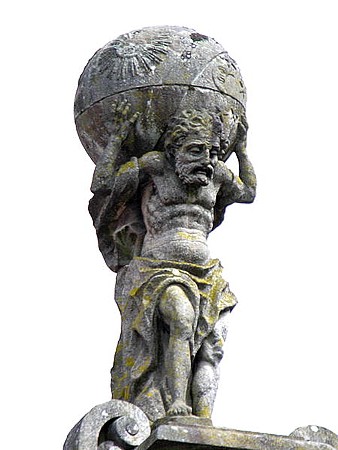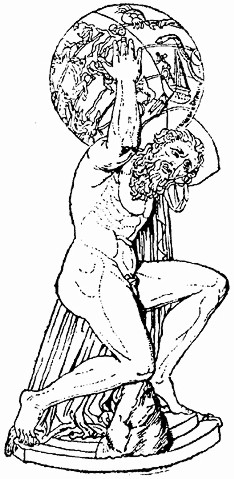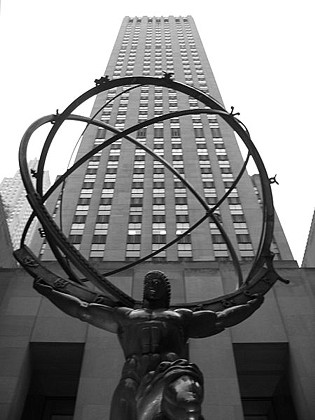Lessico
Atlante

Atlante
- Praza do Toural - Santiago de Compostela![]()
In greco Átlas,
in latino Atlas-antis: gigante della mitologia greca, figlio di Giapeto![]() e
dell'oceanina Climene (nota anche come Asia), fratello di Prometeo, Epimeteo,
Espero e Menezio, figure di esseri primordiali ribelli all'ordine di Zeus
e
dell'oceanina Climene (nota anche come Asia), fratello di Prometeo, Epimeteo,
Espero e Menezio, figure di esseri primordiali ribelli all'ordine di Zeus![]() . La
ribellione di Atlante prese forma nella sua partecipazione alla lotta dei
giganti contro gli dei. Fu punito da Zeus con la condanna a sostenere il mondo
sulle spalle. Gli si attribuiva la paternità delle Pleiadi
. La
ribellione di Atlante prese forma nella sua partecipazione alla lotta dei
giganti contro gli dei. Fu punito da Zeus con la condanna a sostenere il mondo
sulle spalle. Gli si attribuiva la paternità delle Pleiadi![]() , delle
Iadi e delle Esperidi, nonché di due maschi, Iade ed Espero, che però
secondo altri miti era sua fratello. Il mito greco del titano Atlante, che
sosteneva, in piedi o in ginocchio, la volta del cielo e la Terra, fu
raffigurato, a partire dal sec. VII aC, su vasi, rilievi, specchi, ecc. La più
celebre raffigurazione di Atlante si trova su una metopa del tempio di Zeus a
Olimpia, dove il titano compare con Eracle
, delle
Iadi e delle Esperidi, nonché di due maschi, Iade ed Espero, che però
secondo altri miti era sua fratello. Il mito greco del titano Atlante, che
sosteneva, in piedi o in ginocchio, la volta del cielo e la Terra, fu
raffigurato, a partire dal sec. VII aC, su vasi, rilievi, specchi, ecc. La più
celebre raffigurazione di Atlante si trova su una metopa del tempio di Zeus a
Olimpia, dove il titano compare con Eracle![]() e Atena
e Atena![]() .
.
Altra versione mitologica

Atlante è
un personaggio della mitologia greca. Era uno dei Titani, figlio di Giapeto e
di Climene. Ma secondo una versione più curiosa sarebbe un figlio di Zeus e
di Climene. Secondo Esiodo, Zeus lo costrinse a tenere sulle spalle l'intera
volta celeste. La punizione gli fu inflitta poiché si era alleato al padre di
Zeus, Crono![]() , che guidò
la rivolta contro gli dei dell'Olimpo.
, che guidò
la rivolta contro gli dei dell'Olimpo.
Nell'Odissea
(libro I) viene descritto poeticamente come uno dei pilastri del cielo. Sempre
nell'Odissea, viene indicato come padre di Calipso. Atlante riuscì a
convincere Eracle a sostituirlo temporaneamente nella sua punizione, a patto
che quegli andasse a raccogliere i pomi d'oro delle Esperidi![]() . Tuttavia
per Eracle fu assai difficile convincere Atlante a riprendere il suo posto, e
dovette ricorrere a uno stratagemma. Perseo gli mostrò la testa di Medusa, e
così Atlante si trasformò nell'omonimo monte che si trova nel nord
dell'Africa. Con queste spoglie, Atlante continuò a sorreggere la volta
celeste.
. Tuttavia
per Eracle fu assai difficile convincere Atlante a riprendere il suo posto, e
dovette ricorrere a uno stratagemma. Perseo gli mostrò la testa di Medusa, e
così Atlante si trasformò nell'omonimo monte che si trova nel nord
dell'Africa. Con queste spoglie, Atlante continuò a sorreggere la volta
celeste.

Lee Lawrie's colossal bronze Atlas, Rockefeller Center, New York.
The etymology of the name Atlas is uncertain and still debated. Virgil took pleasure in translating etymologies of Greek names by combining them with adjectives that explained them: for Atlas his adjective is durus, "hard, enduring", which suggested to George Doig that Virgil was aware of the Greek tlênai "to endure"; Doig offers the further possibility that Virgil was aware of Strabo's remark that the native North African name for this mountain was Douris.
Some modern linguists derive it and its Greek root from the Proto-Indo-European root *tel, 'to uphold, support'; others suggest that it is a pre-Indo-European name. Others suggest that Atlas comes from the Pelasgian language, and is related to the Greek borrowing "thalassa" (= sea). The Etruscan name for Atlas, aril, is etymologically independent.
In Greek mythology, Atlas was one of the primordial Titans. Atlas was the son of the Titan Iapetus and the Oceanid Asia or Klyméne: "Now Iapetus took to wife the neat-ankled maid Clymene, daughter of Ocean, and went up with her into one bed. And she bare him a stout-hearted son, Atlas: also she bare very glorious Menoetius and clever Prometheus, full of various wiles, and scatter-brained Epimetheus."
Hyginus emphasises the primordial nature of Atlas by making him the son of Aether and Gaea. In contexts where a Titan and a Titaness are assigned each of the seven planetary powers, Atlas is paired with Phoebe and governs the moon. He had three brothers — Prometheus, Epimetheus and Menoetius.
Atlas, along with his brother Menoetius, sided with the Titans in their war against the Olympians, the Titanomachy. His brothers Prometheus and Epimetheus weighed the odds and betrayed the other Titans by forming an alliance with the Olympians. When the Titans were defeated, many of them (including Menoetius) were confined to Tartarus, but Zeus condemned Atlas to stand at the western edge of Gaia, the Earth and hold up Ouranos, the Sky on his shoulders, to prevent the two from resuming their primordial embrace. Thus he was Atlas Telamon, "enduring Atlas".
A common misconception is that Atlas was forced to hold the Earth on his shoulders, but this is incorrect. Classical art shows Atlas holding a Celestial Sphere, not a Globe. In a late story, a giant named Atlas tried to drive a wandering Perseus from the place where the Atlas mountains now stand. Later, out of pity, Athena revealed Medusa's head, turning Atlas to stone. As is not uncommon in myth, this account cannot be reconciled with the far more common stories of Atlas' dealings with Heracles, who was Perseus' great-grandson. According to Plato, the first king of Atlantis was also named Atlas, but that Atlas was a mortal son of Poseidon. A euhemerist origin for Atlas was as a legendary Atlas, king of Mauretania, an expert astronomer.
One of the hero Heracles' Twelve Labors involved the acquisition of some of the golden apples which grow in Hera's garden, tended by the Hesperides and guarded by the dragon Ladon. Heracles went to Atlas, the father of the Hesperides, and offered to hold the heavens for a little while in exchange for the apples, to which Atlas agreed. This would be an easy task for Atlas since he is related to the Hesperides who tend the apples in Hera's garden. Upon his return with the apples, however, Atlas attempted to trick Heracles into carrying the sky permanently by offering to deliver the apples himself. Heracles, suspecting Atlas didn't intend to return again, pretended to agree to Atlas' offer, asking only that Atlas take the sky again for a few minutes so Heracles could rearrange his cloak as padding on his shoulders. When Atlas set down the apples and took the heavens upon his shoulders again, Heracles took the apples and ran away. In some versions, Heracles instead built the two great Pillars of Hercules to hold the sky away from the earth, liberating Atlas much as he liberated Prometheus.
Atlas' best-known cultural association is in cartography. The first publisher to associate the Titan Atlas with a group of maps was Antonio Lafreri, on the title-page to Tavole moderne di geografia de la maggior parte del mondo di diversi autori; however, he did not use the word "atlas" in the title of his work, an innovation of Mercator who dedicated his "atlas" specifically "to honour the Titan, Atlas, King of Mauritania, a learned philosopher, mathematician, and astronomer."
Since the middle of the sixteenth century, any collection of cartographic maps has come to be called an atlas. Gerardus Mercator was the first to use the word in this way, and he actually depicted the astronomer king. Atlas continues to be a commonly used icon in western culture (and advertising), as a symbol of strength or stoic endurance. He is often shown kneeling on one knee while supporting an enormous round globe on his back and shoulders. The globe originally represented the celestial sphere of ancient astronomy, rather than the earth. The use of the term atlas as a name for collections of terrestrial maps and the modern understanding of the earth as a sphere have combined to inspire the many depictions of Atlas' burden as the earth.
Atlas was used as a symbol in Ayn Rand's novel, Atlas Shrugged. Atlas is used as a metaphor for the people who produced the most in society. Mickey à travers les siècles (Mickey through the centuries) was a French comic strip series published in the early 1970s featuring Mickey Mouse as a time traveller. At one stage he assisted Heracles in his twelve tasks. The story gave an interesting spin on the legend of Atlas: in this version he is an ordinary king with a passion for geography. He builds a large globe representing the Earth and he and Heracles carry it to a suitable location. The Hesperides are his daughters and the golden apples are oranges.
Sources describe Atlas as the father, by different goddesses, of numerous children, mostly daughters. Some of these are assigned conflicting or overlapping identities or parentage in different sources.

The
Farnese Atlas, a 2nd century Roman copy
of a Hellenistic work (Naples).